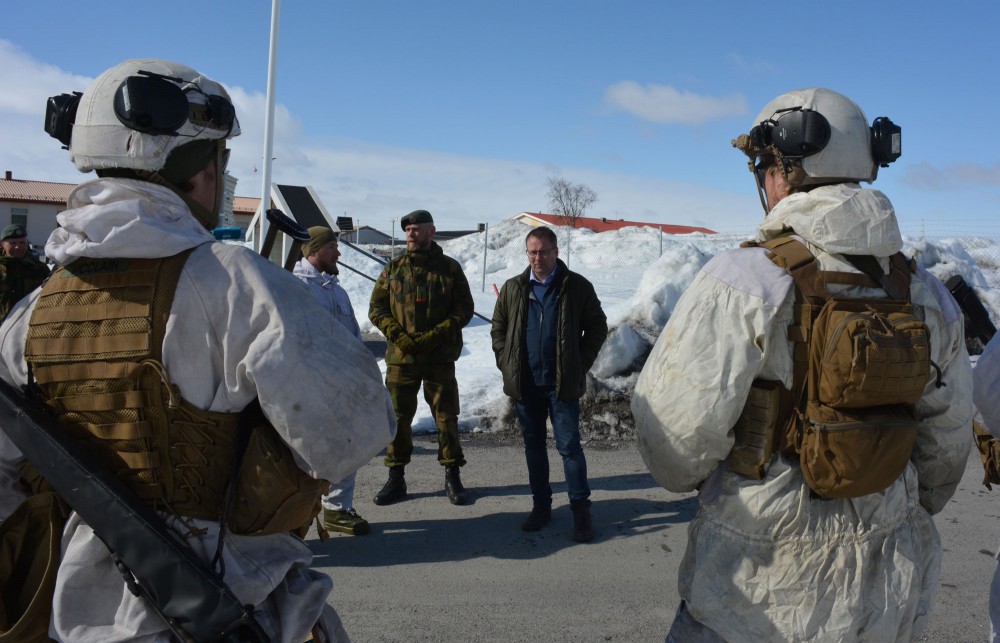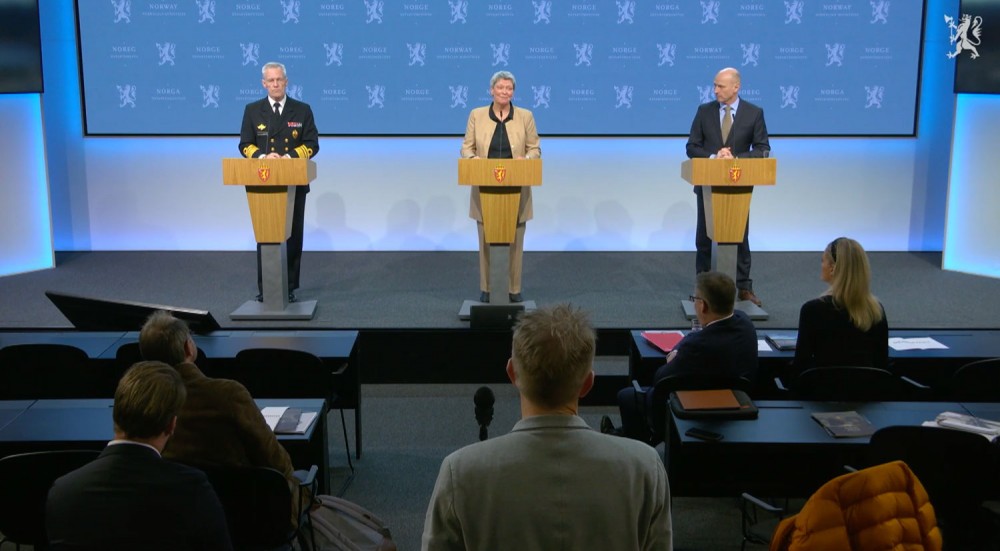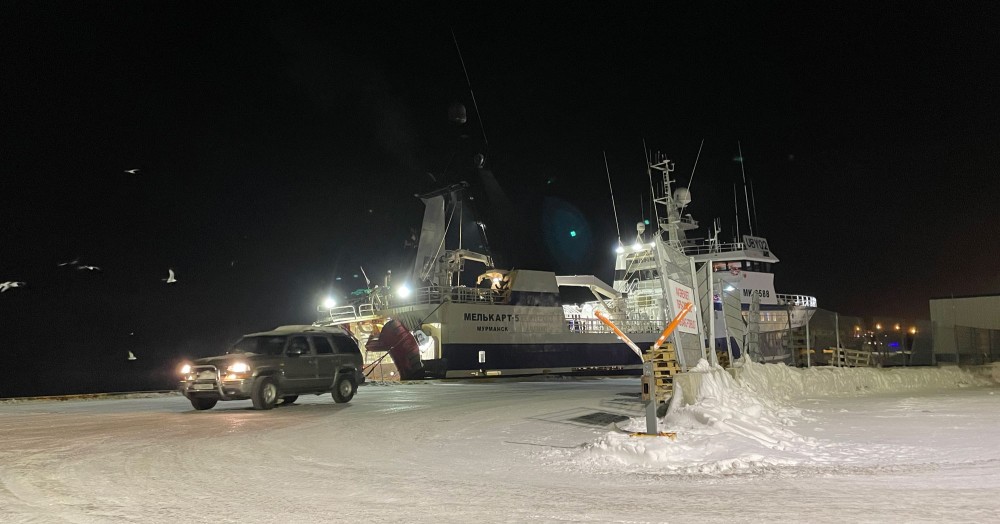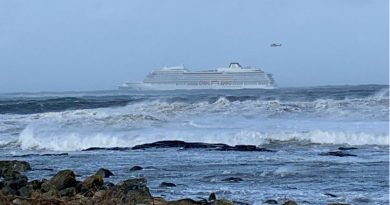Norwegian intelligence warns about mounting Russian threats

Norway has not faced such serious threats against its national security in several decades, the country’s three main intelligence authorities warn in new reports. Among the key targets of malevolent foreign forces is Norwegian underwater infrastructure.
“The current security situation is serious. There is a full-scale invasion war ongoing in Europe. We are standing at a crossroads […],” Minister of Defence Bjørn Arild Gram said as Norway’s three main intelligence agencies on Monday presented their annual reports.
“Small states like Norway must manoeuvre with wisdom and take security policy risks into account in decisions made in all sectors,” he underlined.
The press conference in Oslo took place only few days after Gram delivered a keynote speech in the Oslo Military Society where he reiterated Norway’s commitment to support Ukraine’s resistance fight “as long as it takes.”

The press conference was attended also by Justice Minister Emilie Enger Mehl, who underlined that the current situation affects “all parts of society.”
In subsequent presentations, the leaders of Norway’s military intelligence, the Police Security Service (PST) and the Norwegian National Security Authority (NSM) presented reports that all point at Russia as the main threat against the country.
“The Russian military forces remain the main dimension in the military threats against Norway’s sovereignty, territory, central society institutions and infrastructure,” the Focus2024, reads. According to the annual report from the Norwegian Military Intelligence Service, Norway’s extensive underwater oil and gas pipelines and internet infrastructure is a key target of malevolent Russian activity.
Russia has over several years mapped Norway’s oil and gas infrastructure, and this kind of mapping still continues, the report explains, and warns that “this knowledge can have significance in a conflict situation.”
According to the report, Russia’s Northern Fleet has deep water capacities that pose a serious threat to western underwater infrastructure.

“The Russian underwater intelligence program (GUGI) has at its disposal advanced surface vessels, submarines and other capacities for mapping, reconnaissance and sabotage against civilian communication cables and underwater installations,” the Norwegian intelligence service warns.
“GUGI has a significant capability to threaten Norwegian and Western critical underwater infrastructure and energy sectors,” it adds.
GUGI is the nickname for the Main Directorate for Deep Sea Research, a unit directly subordinated the General Staff of the Russian Armed Forces. From its base in Olenya, about 100 kilometers east of the border to Norway, a fleet of nine nuclear-powered submarines and a few surface vessels frequently sails out on special missions.
The seabed infrastructure is highlighted also by the Police Security Service (PST).
According to the PST, Russian intelligence services actively use civilian vessels for operations in Norwegian waters. They map Norwegian and allied military capacities, underwater and coastal infrastructure, the annual report reads.
Most exposed to sabotage are objects connected with Norwegian natural gas exports, and a sabotage attack could have an aim of triggering or deepening an energy crisis in Europe, the report reads.
The overarching objective could in such a case be to distort the country’s determination to continue military support to Ukraine, the PST argues.
Russia has already displayed its capacity to attack underwater infrastructure.
In early 2022, one of the fiberoptic cables that connect the Arctic archipelago of Svalbard with the Norwegian mainland was disrupted following what investigators believe could have been sabotage.
In November 2021, the Norwegian Marine Research Institute informed that its Lofoten–Vesterålen Ocean Observatory was out of service after about 4 km of a 60 km long underwater cable somehow had disappeared.

And in 2023, the Chinese-Russian vessel Newnew Polarbear became key suspect in the disruption of a gas pipeline and two communication cables in the Baltic Sea. The ship soon fled into Russian Arctic waters.
Only few days ahead of the publishing of the reports by the Norwegian intelligence services, the Norwegian government announced that a series of measures are being taken to protect underwater infrastructure. Since late 2022, a Norwegian authorities have together with industry experts, the defence sector and the National Telecommunication Authority made careful examinations of the pipeline grid.
New technology for surveillance of the pipelines and cables have been acquired. Involved in the surveillance has been military research ship H.U. Sverdrup II, the Norwegian government informs.
According to government, the heightened level of security around the underwater infrastructure is of key importance for strengthening preparedness and prevent sabotage on the shelf.
Related stories from around the North:
Canada : Canadian military says it has tracked, stopped China surveillance in Arctic waters, The Canadian Press
Iceland : Iceland authorizes U.S. submarine service visits, Eye on the Arctic
Finland: Thousands may be waiting to cross Finnish-Russian frontier, border official says, Yle News
Norway: Jaeger battalion GSV gets weapons to destroy low-flying aircraft and drones, The Independent Barents Observer
Sweden : Russian spy ships surveying Nordic energy infrastructure, Radio Sweden
United States: Arctic Security-University of Alaska Anchorage to lead center of excellence, Eye on the Arctic



